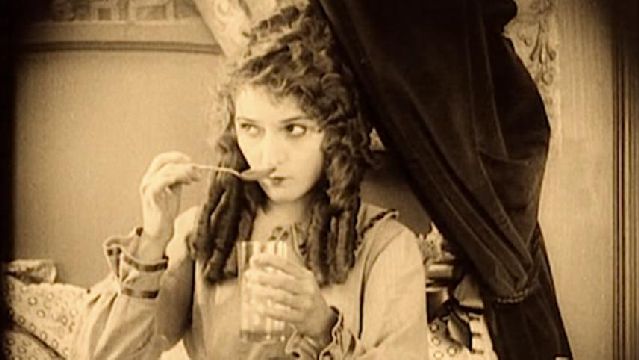The Poor Little Rich Girl (1917) 

Director: Maurice Tourneur
Cast: Mary Pickford, Madlaine Traverse, Charles Wellesley
Synopsis: Gwen’s family is rich, but she is lonely and unhappy until a servant’s mistake changes everything.
The Poor Little Rich Girl of the title is ten-year-old Gwen (Mary Pickford — Heart o’ the Hills, Little Annie Rooney), the neglected daughter of a businessman father (Charles Wellesley — The Lost World) and socialite mother (Madlaine Traverse — The Penalty). The three of them live in a big, rambling mansion in which Gwen spends much of her time playing alone. The attitude towards Gwen of the small army of servants and tutors employed by her parents is one of impatient, strained tolerance and yet they seem to go out of their way to ensure she has no contact with any of the neighbourhood children (Ironically, the opulent mansion in which Gwen lives appears to be surrounded by tough urchins who play with impunity). Despite the staff’s treatment of her, and the boredom of attending a classroom in which she is the only pupil, Gwen’s irrepressible spirit remains undimmed, and her parents finally come to realise just how much they love their daughter when her life hangs in the balance after a negligent maid gives her an overdose of a potent sleeping draught.
It’s not until The Poor Little Rich Girl is more than half over that we learn that its’ title character is closing in on her eleventh birthday. Although Pickford was adept at capturing the expressions and postures of a child, she seemed incapable of distinguishing between the way in which the movements and mannerisms of a five-year-old differ from those of an eleven-year-old, and until that revelation of her impending eleventh birthday it’s virtually impossible to gauge just what age Gwen is supposed to be. And there’s something… odd… about a 24-year-old woman playing the part of a 10-year-old girl. Undoubtedly, this could merely be a consequence of the times in which we live, but when viewed today the insidious suspicion that at least part of the popularity of Pickford’s woman-child act was down to its pandering to the less savoury appetites of a small section of the male audience is unavoidable. It was probably never an intention of the filmmakers to pander to such debased tastes but, nevertheless, paedophiles and the like weren’t invented in 1972 and had to get their jollies somewhere…
The episodic structure of The Poor Little Rich Girl means that the relatively short running time feels longer than it is, and it isn’t helped by some truly cringe-worthy intertitles. “Daddy, don’t you have time to love me?” asks the plaintive Gwen at the knee of her stockbroker father as he struggles to survive the fall-out from the Stock Market crash. When her mother promises to try and spare a little time for her tomorrow, Gwen enquires just as plaintively “Why do my tomorrows never come?” It’s a technique brazenly designed to manipulate the emotions of an audience we like to think of as less sophisticated as our own generation, and this seesawing between broad humour — mud fights with the local kids, a disastrous attempt to befriend the snooty daughter of one of her mother’s society friends — and pathos feels more than a little forced.
The non-existent plot finally acquires some focus in a final act which sees the movie take an altogether unexpected direction. It’s not that we can’t foresee that the life of little Gwen has to be placed in peril of some kind in order to slap her parents out of their selfish lifestyles, it’s just the bizarre manner in which Frances Marion’s screenplay chooses to do so. While doped up by the overdose of a sleeping draught, Gwen experiences a lengthy dream in which her fevered imagination translates the metaphors she has heard used by the adults around her in the real world into literal interpretations. For example, a maid described as two-faced is seen to have a face on either side of her head. The result is reminiscent of gentle fantasies like Alice in Wonderland and The Wizard of Oz, and is quite effective even if it is at odds with the rest of the picture. It’s a shame that director Maurice Tourneur was unable to expend as much creativity and imagination on the rest of the movie as he is on this fascinating sequence — The Poor Little Rich Girl would be all the richer for it…
(Reviewed 16th August 2014)
httpv://www.youtube.com/watch?v=fsqUkm1PCvA
